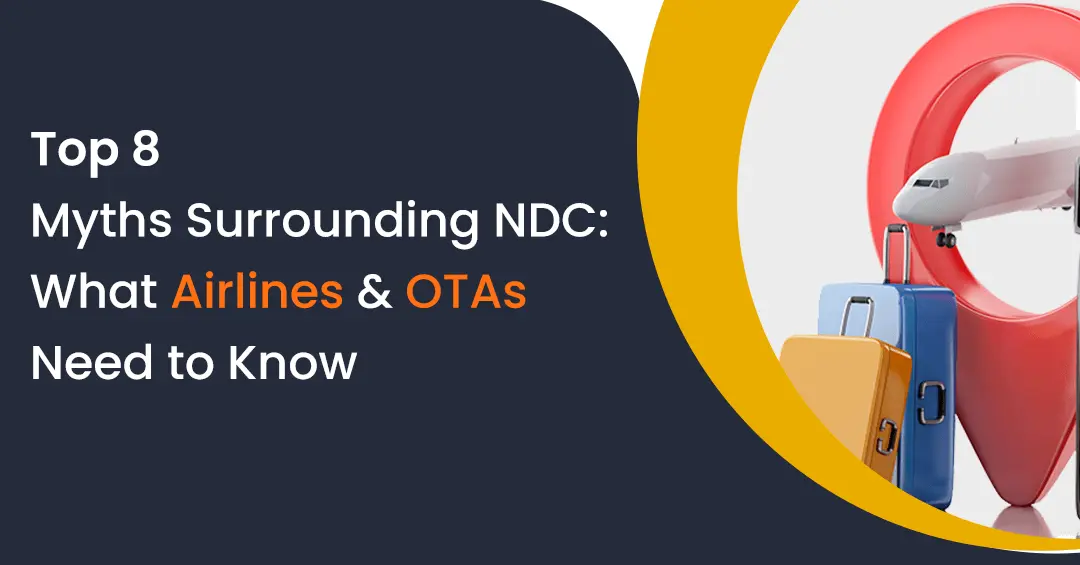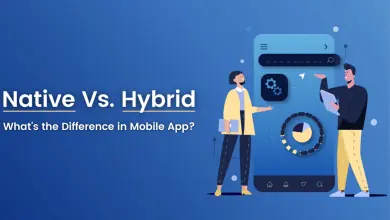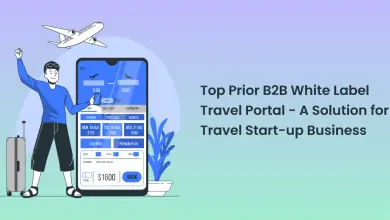Top 8 Myths Surrounding NDC: What Airlines and OTAs Need to Know

Origins of NDC: Separating Myth from Reality
NDC stands for New Distribution Capability, and represents a significant advancement in the travel industry’s approach to distributing air travel services. It is a standardized framework developed by the International Air Transport Association (IATA) that aims to modernize and streamline the distribution of air travel products and services. Contrary to some misconceptions, NDC is not a novel concept; its inception dates back to 2012. This initiative was prompted by the increasing demand for personalized and more efficient travel experiences Airlines and OTAs.
Initially, NDC was envisioned as a means to create a distribution system that would be more efficient and transparent. It aimed to enable airlines to directly offer ancillary products and services to both travel agent organizations and consumers. By doing so, airlines could better distinguish themselves in a fiercely competitive market and bolster their revenue streams.
IATA played a pivotal role in facilitating the development and promotion of NDC. It brought together various stakeholders from airlines, travel agent organizations, and technology providers to collaborate on crafting a new distribution standard that would benefit all participants within the travel industry.
Timeline of NDC Evolution
NDC’s evolution can be traced through a timeline that began in 2012. The first version of the NDC schema was introduced at this time, defining the structure and content of messages related to airline offers and orders. Over the years, NDC has undergone numerous updates and enhancements, with the most recent version, NDC 19.2, being released in 2019. The adoption of NDC has been a gradual process, with airlines and Online Travel Agencies (OTAs) incrementally implementing the standard and integrating it into their systems and operational processes. This ongoing evolution reflects the industry’s commitment to embracing innovative technology and improving the travel booking experience.
Now, let’s shift our attention to dispelling some of the commonly held misconceptions surrounding NDC. We’ll subject these beliefs to a rigorous examination, relying on solid facts and data as our litmus test. So, without any more delay, let’s begin.

Myth #1. Isn’t The Evolution of NDC Just a Passing Phase?
Transparency is paramount in today’s consumer-centric world. NDC aims to provide customers with a transparent shopping experience by offering detailed information about fares, ancillary services, and terms and conditions. This transparency empowers customers to make informed decisions based on their preferences and needs.
Global adoption trends and predictions
- The New Distribution Capability (NDC) has rapidly gained traction in the airline industry, revolutionizing the way air products are distributed. With over 100 airlines and 30 Online Travel Agencies (OTAs) adopting NDC as of 2021, it has become clear that this new distribution model is here to stay.
- NDC adoption has not been uniform across the globe, with Europe leading the way in embracing this transformative technology. North America, Asia-Pacific, and the Middle East have also shown significant interest and progress in implementing NDC. This global adoption trend highlights the industry’s recognition of the potential benefits that NDC offers.
Commitments from major industry stakeholders
- Major industry stakeholders, including renowned airlines such as Lufthansa Group, British Airways travel trade, Air France-KLM, and Emirates, have committed to NDC. Their involvement underscores the industry’s acceptance and confidence in this new distribution model. By embracing NDC, these airlines are demonstrating their willingness to adapt and evolve with changing market dynamics.
- Despite some misconceptions, NDC is not limited to certain types of airlines or travel agent organizations. It offers flexibility and adaptability to accommodate various business models and operational constraints. Whether an airline or third party travel agency is large or small, NDC can be successfully implemented to unlock its numerous benefits.
The long-term vision of NDC in airline distribution
- The long-term vision of NDC in airline distribution is to address the industry’s current limitations and transform the way air products are retailed. Three key areas that NDC aims to improve are product differentiation and time-to-market, access to full and rich air content, and a transparent shopping experience.
- Product differentiation and time-to-market are crucial factors in today’s highly competitive airline industry. NDC enables airlines to offer unique and personalized products and services to their customers. By leveraging NDC’s capabilities, airlines can create tailored offers that cater to specific customer needs, enhancing customer satisfaction and loyalty.
Key Takeaway: As NDC continues to evolve, it will reshape the airline distribution landscape. The industry can expect further advancements in technology, increased collaboration among stakeholders, and enhanced customer experiences. The potential for innovation and growth is immense, as NDC opens up new avenues for airlines and travel agent organizations to connect with customers in a more personalized and efficient manner.
Myth #2. NDC and GDS Systems Can Not Coexist
One prevalent misconception about the NDC conversion tool is that it competes directly with Global Distribution Systems (GDS). This misconception often arises from a simplified understanding of these two distribution methods within the travel industry. It’s essential to recognize that NDC and GDS serve distinct roles and functions in the complex travel distribution ecosystem.
How NDC Complements, and NOT Competes With GDSs
- In actuality, NDC conversion tool and GDS systems serve distinct functions and can harmoniously coexist to establish a more comprehensive and efficient distribution ecosystem, benefiting airlines and Online Travel Agencies (OTAs).
- While GDS systems primarily focus on consolidating and disseminating content from various airlines, NDC empowers airlines to offer travelers more personalized and dynamic content directly.
Examples of Airlines Leveraging Both Platforms
- Numerous airlines have acknowledged the advantages of integrating NDC travel into their pre-existing GDS systems, rather than supplanting them.
- Take, for instance, Lufthansa Group, an early advocate for NDC; it has adopted a dual approach by providing NDC travel content alongside its traditional GDS content.
- This strategy enables the airline to expand its reach to a wider audience while still bestowing numerous IATA benefits for travel agents, including personalized offers and ancillary services, upon travelers.
Benefits of an Integrated Approach
- Through the integration of NDC travel with GDS systems, airlines can harness the strengths of both platforms, furnishing a more all-encompassing and efficient distribution solution.
- For a third party travel agency, this unified approach grants access to a broader spectrum of content and services, enhancing the shopping experience for their clientele.
- Furthermore, a merged NDC-GDS solution can facilitate operational streamlining for airlines and travel agency organizations, leading to cost reductions and improved revenue management ultimately yielding IATA benefits for travel agents and the entire industry.
Myth #3. NDC Is All About Selling Airline Tickets, isn’t it?
Another common misconception surrounding New Distribution Capability (NDC) is its sole focus on selling airline tickets, leading some to believe that its application is limited to merely facilitating the booking of flights. However, this notion fails to capture the true breadth and versatility of NDC’s capabilities within the travel industry.
Beyond Ticket Sales: A Multifaceted Approach
- Through NDC travel, airlines can seamlessly offer travelers ancillary services, including seat selection, baggage options, and in-flight amenities. These offerings can be presented directly via airline channels or third-party platforms.
- Furthermore, NDC conversion tool empowers airlines to craft personalized offers and experiences by harnessing data and advanced analytics to tailor products and services to individual traveler preferences.
Shifting from Ticket-Centric to Customer-Centric Practices
- NDC ticketing system signifies a pivotal shift in the airline industry, transitioning from a ticket-centric paradigm to a customer-centric approach.
- Instead of concentrating solely on selling flight seats, NDC travel empowers airlines to provide comprehensive travel experiences that encompass pre-flight, in-flight, and post-flight services, all finely tuned to meet the unique needs and desires of travelers.
- This customer-centric orientation not only elevates the shopping experience for travelers but also enables airlines to cultivate stronger customer relationships, leading to heightened loyalty and revenue.
Merchandising Opportunities through NDC
- NDC ticketing system unlocks a trove of new merchandising prospects for airlines, enabling them to showcase their array of products and services in a captivating and interactive manner.
- Airlines can leverage NDC to create compelling multimedia content, including videos, images, and detailed descriptions, to showcase the distinctive qualities and advantages of their offerings.
- This enhanced merchandising prowess empowers airlines not only to stand out in a crowded marketplace but also to engage in upselling and cross-selling of ancillary services, thereby augmenting their revenue per passenger.
Myth #4. NDC Integration can be overwhelmingly expensive
One of the prevailing misconceptions often linked to the process of NDC integration is the mistaken belief that it represents a costly endeavor for both airlines and modern travel agency. This misconception stems from a common assumption that adopting NDC technology incurs substantial upfront expenses and ongoing financial commitments.
Balancing Short-Term Investment with Long-Term Gains
- It’s crucial to recognize that while there may be initial expenses linked to NDC implementation, assessing the long-term advantages and return on investment (ROI) is equally vital.
- The integration of NDC can serve as a catalyst for operational streamlining, cost reduction, and enhanced revenue management, ultimately contributing to heightened profitability and competitiveness in the marketplace.
The Cost Ramifications of Not Embracing NDC
- Neglecting NDC integration can also entail financial consequences for airlines and any third party travel agency.
- Airlines and any retail travel agency that abstain from NDC travel may forego revenue prospects stemming from personalized offers, ancillary services, and enriched merchandising, as travelers increasingly demand a tailored and all-encompassing shopping experience.
- Travel agency organizations that refrain from offering NDC content run the risk of losing customers to rivals capable of providing a more extensive array of products and services.

The ROI Potential through Successful Integration
- The potential return on investment (ROI) through effective NDC integration can be substantial for both airlines and travel agent organizations .
- As per a study by Atmosphere Research Group, airlines that have seamlessly implemented NDC have experienced an average revenue boost of 5% to 10% per passenger.
- Furthermore, a report by IATA and Sabre revealed that airlines can achieve a remarkable 10% to 20% surge in ancillary revenue through NDC-enabled merchandising.
- These statistics underscore the capacity of NDC integration to deliver a compelling ROI and enduring financial advantages for airlines and OTAs.
Myth #5. NDC is Only for the Big Players
A widespread belief regarding NDC integration suggests that it exclusively favors large airlines and Online Travel Agencies (OTAs) with substantial resources and capabilities. Let’s test the waters and see how much gravitas this statement holds
Examples of Mid-Sized and Smaller Airlines & OTAs Benefiting
- In real-life cases, NDC ticketing system extends its advantages to entities of all sizes, including mid-sized and smaller players within the industry.
- For instance, Air Baltic, a mid-sized airline, has seamlessly incorporated NDC, enabling them to furnish personalized offers and ancillary services to their clientele, ultimately resulting in augmented revenue and heightened customer satisfaction.
- Similarly, smaller retail travel agency like Kiwi.com have harnessed the potential of NDC to access a broader spectrum of content and services, amplifying their value proposition and attracting an expanded customer base.
How NDC levels the playing field for all?
- NDC travel possesses the intrinsic capability to level the competitive landscape for airlines and any third party travel agency, regardless of their dimensions.
- By facilitating the delivery of personalized and dynamic content, NDC empowers smaller enterprises to stand toe-to-toe with their larger, more established counterparts, rendering a distinct and customized experience for their customers.
- Furthermore, NDC fosters more efficient collaboration between airlines and travel agent organizations, affording smaller entities equivalent access to content and services as their larger counterparts, thereby bolstering their competitive stance within the market.
Tailoring NDC Strategies to Suit Different-Sized Entities
- While NDC ticketing system stands to benefit airlines and OTAs across the spectrum of sizes, it is imperative to craft a tailored NDC strategy that harmonizes with the distinct requirements and capabilities of each entity.
- Smaller players may opt to engage technology providers, such as OneClick, to gain access to NDC content and services, whereas larger entities might opt for in-house development and integration.
- Through a comprehensive understanding of the unique challenges and opportunities inherent to each entity, NDC API integration partners can guide airlines and OTAs in devising and executing strategies that optimize the advantages of NDC travel, regardless of their scale.
Myth #6. NDC does not make any substantial impact on Customer Experience
A prevailing misconception regarding NDC suggests that its impact on the customer booking experience is relatively minor. In reality, NDC has the potential to elevate the entire customer journey, spanning from the initial search phase to the final payment.
Influencing Customer Touchpoints: From Search to Payment
- With NDC API, airlines and OTAs possess the capability to furnish more personalized and pertinent search results, taking into account factors such as the traveler’s preferences, loyalty status, and prior booking history.
- NDC also ushers in a more seamless and efficient booking process, characterized by real-time updates on availability and pricing. This ensures that customers are equipped with the most current and relevant information as they navigate their purchasing decisions.
- Furthermore, NDC introduces greater flexibility in payment options, granting customers the freedom to pay for ancillary services separately or through convenient installment plans. This expanded array of choices heightens customer convenience and satisfaction.
NDC’s Integral Role in Refining and Personalizing the Customer Journey
- NDC occupies a pivotal role in refining and personalizing the customer journey, simplifying the process for travelers seeking to identify and secure products and services aligned with their specific requirements.
- For instance, NDC empowers airlines and OTAs to offer customized bundled packages that amalgamate flights, accommodations, and car rentals to align with the individual preferences and financial considerations of each traveler.
- NDC additionally facilitates smoother connections and transfers by delivering real-time updates concerning gate changes, delays, and other pertinent information. This, in turn, contributes to a more seamless and hassle-free travel experience for customers.
Enhanced Clarity in Offerings and Charges
- Another noteworthy benefit of NDC travel lies in its capacity to enhance transparency pertaining to offers and charges, thereby assisting customers in making well-informed decisions during the booking process.
- Through NDC travel, airlines and modern travel agency can furnish detailed insights into the services encompassed within the fare, as well as any supplementary charges applicable to ancillary services, such as baggage handling, seat selection, and in-flight dining.
- This heightened level of transparency not only aids customers in comprehending the value associated with their selections but also facilitates effortless comparisons between offers, ultimately fostering a more competitive and customer-centric marketplace.
Myth #7. Data Privacy Concerns: NDC isn’t Secure!
An all too common misconception surrounding NDC contends that it may inadvertently jeopardize data privacy and security. In truth, NDC boasts a robust framework of data protection measures designed to safeguard the confidentiality and integrity of customer information.
Data protection measures within NDC
- Data privacy emerges as a paramount concern within the travel industry, and the realm of NDC is no exception. Nevertheless, NDC is fortified by an array of data protection measures meticulously crafted to uphold the security and sanctity of customer data.
- NDC relies on secure communication protocols, such as HTTPS, to encrypt data transmission between airlines, travel agent organizations, and customers. This impenetrable encryption serves as a bulwark against unauthorized access, ensuring that sensitive information remains inviolable.
- Furthermore, NDC empowers customers with greater control over their personal data, extending options to either opt-in or opt-out of data sharing and personalized offers. This bespoke approach ensures that customers’ privacy preferences are meticulously honored.
Alignment with global data privacy regulations
- NDC travel stands as a bastion of compliance with global data privacy regulations, including but not limited to the European Union’s General Data Protection Regulation (GDPR) and the California Consumer Privacy Act (CCPA).
- Airlines and travel agent organizations embarking on the NDC API integration journey must diligently adhere to these stringent regulations, thereby safeguarding customer travel data and upholding transparency regarding the collection, utilization, and dissemination of data.
- Through unwavering fidelity to these data privacy regulations, NDC assumes the role of a standard-bearer for customer trust and confidence within the travel industry. This steadfast commitment ensures that personal information is treated with responsibility and shielded with unwavering security.
Fostering Customer Trust and Preserving Data Integrity
- Data privacy and security represent linchpins in the maintenance of customer trust and loyalty. Airlines and OTAs embarking on NDC API integration must accord the highest priority to data integrity, underpinned by substantial investments in robust cybersecurity measures.
- By signaling an unswerving allegiance to data privacy and security, airlines and OTAs can effectively distinguish themselves in the market, attracting discerning customers who prioritize the sanctity of their personal information. This commitment, in turn, solidifies a positive and secure booking experience, forging enduring relationships with customers built on trust and confidence.
Myth #8. NDC Integration can be challenging for different-sized companies
A common misconception surrounding NDC is the perceived complexity and time investment associated with its implementation. This notion is particularly prevalent among mid-sized and smaller airlines and OTAs. While integrating NDC travel does present certain challenges, they are by no means insurmountable, especially when the right strategy and expertise come into play.
Complexity of NDC Implementation: It’s Easier with the Right Partner
- Large airlines and OTAs may grapple with the intricacies of NDC API integration due to their intricate legacy systems and well-established processes. Conversely, mid-sized and smaller entities might be deterred by limited resources and technical capabilities, which can make NDC integration appear formidable.
- However, it’s crucial to recognize that with the right partner and a meticulously devised integration strategy, airlines and OTAs of all sizes can confidently embark on the journey of NDC integration, poised to unlock its myriad benefits.

The Imperative of Selecting the Ideal Technology Partner: OneClick
- When contemplating NDC integration, the choice of a technology partner assumes paramount significance. The selection of the right partner can be the linchpin to a seamless and successful NDC implementation. This is where OneClick emerges as a beacon of assurance.
- OneClick boasts an extensive track record of NDC integration, replete with invaluable expertise garnered through assisting airlines and OTAs in navigating the multifaceted intricacies of the process.
- Our cadre of experts is committed to forging a close-knit partnership with your organization, ensuring an intimate understanding of your distinct challenges. Together, we collaborate to sculpt a tailored integration blueprint that harmonizes seamlessly with your business objectives and the resources at your disposal.
- Partnering with OneClick empowers you to harness our proficiency and industry insights, allowing for the streamlined orchestration of the NDC travel integration process. This strategic alliance minimizes disruptions to your ongoing operations and accelerates the realization of NDC’s myriad advantages.
Benefits of Successful NDC Integration
- In spite of the initial complexities, a successful NDC API integration furnishes a myriad of rewards for airlines and OTAs. These dividends include amplified revenue streams, courtesy of personalized offers and ancillary sales, heightened customer contentment through an effortlessly seamless booking experience, and augmented operational efficiency, attributed to streamlined processes.
- With a partner like OneClick at your side, the intricacies of NDC implementation are adroitly managed, affording your organization the freedom to concentrate on its core competencies while we adeptly oversee the technical facets of the integration.
Why Choose OneClick?
- The selection of an apt technology partner wields a profound influence on the prosperity of your NDC travel implementation. A proficient tech partner possesses the expertise and experience required to surmount the challenges that invariably accompany NDC API integration, propelling you toward your business objectives and securing the future of travel agents and airlines.
- OneClick stands as a foremost provider of NDC integration services, boasting an intimate comprehension of the NDC standard and the nuances of NDC implementation. Our extensive suite of NDC integration services caters to airlines and travel agency organizations of all dimensions, facilitating the successful implementation of NDC.
- OneClick’s NDC integration services encompass a spectrum of offerings, including NDC consulting, NDC implementation, and NDC managed services. This comprehensive array is meticulously designed to guide airlines and OTAs in their quest for NDC API integration success.
OneClick’s Tailoring NDC Strategies for Diverse Entities
- Regardless of their size, airlines and modern travel agency can reap the benefits of NDC integration. However, it is imperative to craft a bespoke NDC strategy attuned to the unique requirements and capabilities of each entity.
- Larger airlines and travel agency organizations can collaborate with OneClick to devise and execute a custom NDC solution, precisely tailored to their distinctive needs. Additionally, OneClick can assist large airlines and OTAs in data migration and the rigorous testing and validation of their NDC implementations.
- Smaller airlines and modern travel agency can leverage OneClick’s pre-built NDC solution, a cost-effective and time-efficient approach to NDC integration. OneClick also offers unwavering support to smaller players, ensuring the seamless implementation of NDC.
Irrespective of your size, OneClick stands ready to empower your organization with successful NDC integration.





